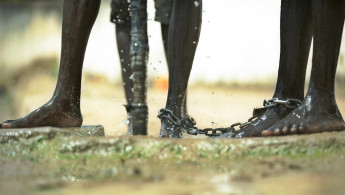Amnesty International condemns soaring number of executions in South Sudan
South Sudan executed at least seven people in February, as many as were executed in 2018 alone. The executions have prompted strong condemnation from Amnesty, which said South Sudan has “no respect for the right to life”.
“This confirms our fears that South Sudan authorities have absolutely no respect for the right to life as they continue to totally disregard the fact that the world is moving away from use of the death penalty,” said Seif Magango, Amnesty International’s Deputy Director for East Africa, the Horn and the Great Lakes.
Three of the seven men executed this month were from the same family. Amnesty says their executions were “shrouded in secrecy”. Their family was only informed of their being hanged after the death of their relatives.
South Sudan allows for the death penalty in cases of murder, bearing false witness resulting in an innocent person’s execution, terrorism or sabotage resulting in death, aggravated drug trafficking and treason. Four of the executed men were accused of murder.
Amnesty said in December that South Sudan had executed more people that year than in any other since its secession from Sudan in 2011. One of the seven people executed in 2018 was a child.
South Sudan government spokesman Ateny Wek Ateny denied Amnesty’s claims in December, claiming that no one was executed in 2018 and a moratorium had been placed on executions in 2013. However, he clarified: “If you kill a person, you will be executed.”
South Sudan looks to surpass that record high in 2019.
More than 300 people were on death row in the country as of December.
“We are shocked and dismayed that executions have become the order of the day in South Sudan. Rather than execute people, the authorities should rehabilitate prisoners and make them well-adjusted individuals that can contribute positively to society,” said Magango.
“These reports are extremely concerning, and we cannot even begin to imagine how the families must be feeling.”
South Sudan plunged into a deadly civil war in 2013 which has killed almost 400,000 people.
Although the government reached a peace deal with the main opposition group, the Sudan People’s Liberation movement, another rebel unit rejected the deal and hostilities have continued.
"We are concerned that if the situation escalates, the progress made in implementing the peace agreement will be irrevocably set back," the United States, Britain and Norway said last week in a join statement.





 Follow the Middle East's top stories in English at The New Arab on Google News
Follow the Middle East's top stories in English at The New Arab on Google News
![Israeli forces ordered bombed Gaza's Jabalia, ordering residents to leave [Getty]](/sites/default/files/styles/image_330x185/public/2176418030.jpeg?h=a5f2f23a&itok=_YGZaP1z)

